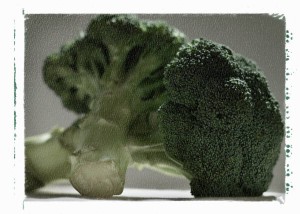Beneficial Broccoli?
 Beneficial Broccoli?
Beneficial Broccoli?
As usual, I found some conflicting information while researching a nutritional subject. Over the literally four decades of my self study of nutrition I have come up against some huge controversies and debates in the nutritional community—eat meat, don’t eat meat, eat all raw, eat cooked foods, drink milk, don’t drink milk, eat lots of grains, don’t eat grains etc. I have examined every one of these ideas and more and it seems that even the research itself is conflicting so I don’t always know who to believe. (***See some of my basic conclusions below.) I thought for sure, that broccoli would be a “safe” subject (be universally viewed as totally heatlhy), but, alas, I even found a conflict with broccolli!
Benefits of Broccoli
First— the benefits of broccoli. Broccoli is high in vitamin C, vitamin K, calcium, vitamin A (beta- carotene), folic acid, polyphenols and fiber, all of which are highly beneficial to the human body. In addition broccoli contains the phytochemicals, indoles and isothicyanates, which some researchers are linking to anti-cancer qualities. Broccoli contains plenty of healthy substances that are attributed to boosting the immune system, lowering the incidences of cataracts, supporting cardiovascular health, building bones and fighting birth defects. Clearly, broccoli should not be ignored!
Here is an excellent article on the positive nutritional qualities of broccoli which also touches upon the controversy, but does not include a complete look at the negative side of this broccoli controversy.
http://whfoods.org/genpage.php?dbid=9&tname=foodspice
The Controversy
(This controversy applies to all the cruciferous vegetables: broccoli, Brussels sprouts, cabbage, cauliflower, collard greens, kale, kohlrabi, mustard, rutabaga, turnip, bok choy arugula, horseradish, radish, wasabi and watercress.)The conflict around broccoli seems to be focused on goitrogens. Goitrogens contain enzymes that interfere with the formation of thyroid hormone.This controversy is especially important if you or your loved ones are having any type of thyroid problems. The differences in opinion are: to what degree is broccoli goitrogenic, the best cooking method for broccoli, and the amount of broccoli to consume.
As in most things, every person needs to make up their own mind and there is no substitute for your own research. I am including more links to the negative side of the controversy simply because that side is less well known and less promoted. Here are some excellent articles to get you started:
An Up-to-Date Look at Goitrogenic Substances in Food A middle of the road opinion by George Mateljan
What are Goitrogens and How Do they Affect the Thyroid? Simple question and answer by Mary Shomon, author of Your Guide to Thyroid Disease
Bearers of the Cross: Crucifers in the Context of Traditional Diets and Modern Science Well-documented article by the Weston A. Price foundation
My conclusions
The most sensible conclusions to me are to not eat a lot of raw broccoli and do not eat an excessive amount of broccoli to begin with (always eat a wide variety of vegetables from all the vegetable families as opposed to focusing on one supposed “super” food). I would also suggest eating as much as possible of your broccoli as organically grown, in season, and fresh or freshly processed (frozen).
*** Some of my basic conclusions for the entire subject of nutrition and what to eat are: 1) eat a wide variety of lots of organically grown, in season vegetables 2)drastically limit your sugar and sugar-substitute containing foods 3)listen to your own body when it comes to food intolerances , insensitivites, and respect your own health challenges 4)limit your intake of preservatives and additives as much as possible, especially ones known to be neurotoxic or carcinogenic 5)limit your intake of any commercially processed foods 6)have as much of your animal products (meat, fish, dairy etc.) be organically raised and minimally processed, but also thoroughly cook your animal flesh items 7) greatly limit your foods that are fried or that contain trans fats or hydrogenated fats 8.) do your own research and use common sense but do not leave out praying and listening to God 9) do not blindly believe any particular source of information particulary the U.S.goverment [I *do* believe *some* of what the U.S. gov’t puts out on nutrition!] 10) take supplements according to your own needs but do not substitute supplements for healthy eating 11) exercise for your overall good health but do not substitute exercise for good eating *Please note that these are not in any particular order of importance.*Please leave a comment if this information has been helpful to you or you would like to leave some of your own conclusions regarding eating and nutrition.
